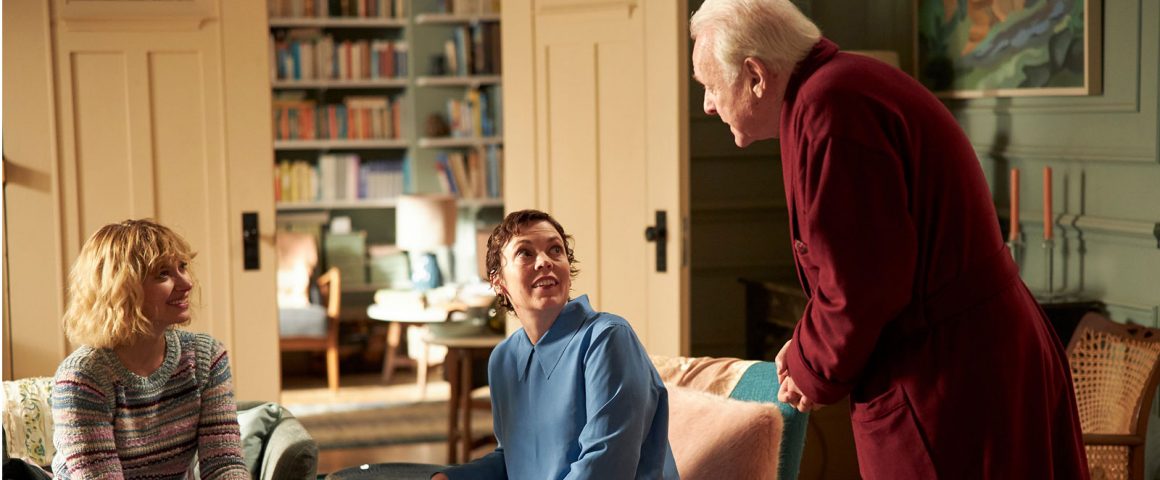Within a few minutes of watching The Father, you may get the sense that this is a dialogue-intense film that seems to bear a resemblance to a stage play. This perception is enhanced by the closed space in which the action occurs — a suitable, lived-in apartment of an educated man with décor that includes bookcases in which many hardcovers are stored with a well-used, respectable-looking piano nearby. A quick examination of the film’s provenance reveals it is an adaption of Florian Zeller’s play of the same name. Now, there is a group of film buffs that complain about adapted plays as being too enclosed or too “talk-heavy” or lacking in action. The Father is guilty as charged, but the film works: The dialogue is brilliant, Anthony Hopkins (“The Two Popes”) is masterful as the central character, and the oppressive interiors are well-chosen for the action. The film could easily have been a one-person show, but the excellence of the acting and the familial conflicts (real or imagined — it’s hard to tell for sure), add to the drama.
Additionally, only cinematic techniques could be capable of presenting such seamless alternative realities that appear to coexist in the film, and are meant to challenge us as viewers to discern which scenes are projections of the major protagonist’s consciousness and which are not. Plenty of films attempt to make the viewer believe in multiple realities or shifts in time or perception, but few do so without a certain clumsiness and with the uncomfortable sensation that one is watching gimmickry. Such films — and there are far too many to list here — may be clever and at times provide us with that “Gee Whiz!” factor, but usually are no more significant than circus acts. The Father, on the other hand, presents competing narratives as elegantly as a world class ballet dancer completes pirouettes: Eloquent as they are meaningful to the narrative of which they are a part.
Florian Zeller’s play from a few years back garnered numerous awards and rave theatrical reviews from British critics. Christopher Hampton co-wrote the film adaptation with Zeller, then handed it over to Zeller to direct. As a movie, especially a debut film, it is quite impressive. Despite its familiar theme, the cognitive decline of an aging, prideful man, it is original and finely executed. The scenes are structured so well and interwoven so expertly, and Hopkins’ shifts in mood are so subtle as he tries to navigate an unreliable reality, that the viewer is often as shocked as the character in learning that what seems to be the “ground zero” of who, what, and where the truth of a life resides is perhaps another hallucination.
The primary anchor in The Father’s life (we never learn the character’s name) is Anne, his dutiful daughter, played subtly and sympathetically by Olivia Colman (“The Favourite”). She is complemented by a fine cast that includes Mark Gatiss (“The Mercy”) as The Man, Imogen Poots (“Vivarium”) as Laura, Olivia Williams (“Victoria and Abdul”) as The Woman, and Rufus Sewell (“Gods of Egypt”) as Paul. The concept of ensemble acting in film is not as common as it is in live theater, but the actors work off one another so effortlessly that the term is appropriate, although, of course, Anthony Hopkins takes center stage or screen.
To help transform the play to film, Ben Smithard has selected a photographic palette that creates an extra layer of emotional and visual confinement by framing the action through doors and hallways. This causes the setting to amplify the tension between the baffled Hopkins and the characters who constantly dispute the reliability of his personal narrative. The pressure becomes so intense you may feel that at any moment the apartment could explode.
In lesser creative hands, the subject matter of the film could devolve into a presentation of clinical symptoms. Or the claustrophobic setting could make an audience yearn for wide open cinema spaces. However, The Father is an exceptional merging of drama, setting, acting, and film structure. It is worth viewing to appreciate these elements. It’s worth multiple viewings if you want to analyze what is required for melding superb dialogue and performance, scene structure, and dramatic tension. Witnessing Hopkins’ confusion provides us with a glimpse into a troubled brain. And if his performance does not move you, you have no heart.



